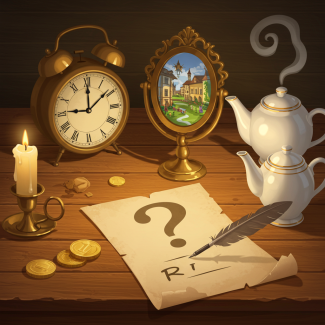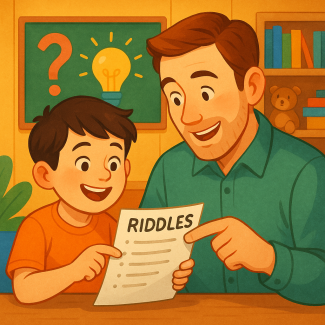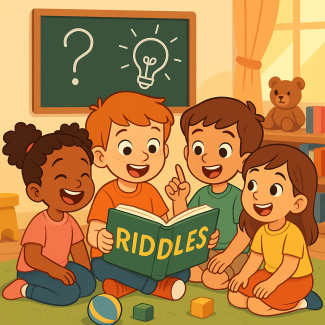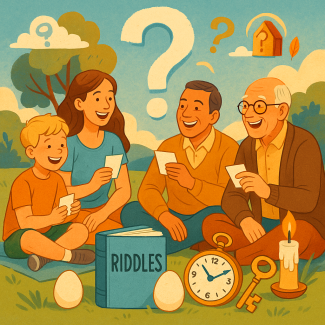
Clever One-Liners and Brain Teasers That Will Make You Smile
Why Short Riddles Are Perfect for Quick Fun and Mental Agility
Short riddles are a timeless form of entertainment that have been passed down through generations. These bite-sized puzzles are not only fun and engaging but also help keep your brain sharp. Whether you're trying to kill time, entertain friends, or just challenge your mind, short riddles offer a simple yet effective way to do it.
Unlike lengthy logic problems, short riddles are quick to understand and even quicker to answer—if you can crack the code. They test your creative thinking, push the boundaries of lateral reasoning, and most importantly, bring a smile to your face.
What Makes a Good Short Riddle?
The Ingredients of a Perfect Riddle
- Brevity: A great short riddle uses minimal words to deliver maximum intrigue.
- Wordplay: Puns, double meanings, and linguistic tricks make riddles fun and memorable.
- A Twist: The best riddles challenge your expectations and flip logic on its head.
- Aha! Moment: Solving a riddle should offer a satisfying mental payoff.
Whether you're 7 or 70, a clever riddle can surprise you, stump you, or make you laugh. They're also perfect for ice-breakers, party games, or spicing up a boring meeting.
Benefits of Solving Riddles
Mental and Social Advantages
- Enhances Cognitive Function: Riddles stimulate your brain and improve your problem-solving skills.
- Boosts Vocabulary: Playing with words expands your understanding and usage of language.
- Reduces Stress: Solving a funny or clever riddle can lighten your mood and help you relax.
- Strengthens Memory: Recalling riddles and answers exercises short- and long-term memory.
- Improves Social Interaction: Sharing riddles is a fun way to connect with others, especially across generations.
Now, let’s dive into a selection of fun, clever, and short riddles anyone can answer—or at least try to!
20 Short Riddles That Are Quick to Ask and Fun to Solve
1. What has hands but can’t clap?
Answer: A clock.
2. What comes once in a minute, twice in a moment, but never in a thousand years?
Answer: The letter "M".
3. I’m tall when I’m young, and I’m short when I’m old. What am I?
Answer: A candle.
4. What can travel around the world while staying in the same corner?
Answer: A stamp.
5. What has a head, a tail, but no body?
Answer: A coin.
6. What has many keys but can’t open a single lock?
Answer: A piano.
7. What gets wetter the more it dries?
Answer: A towel.
8. What has one eye but can’t see?
Answer: A needle.
9. What begins with T, ends with T, and has T in it?
Answer: A teapot.
10. The more you take, the more you leave behind. What are they?
Answer: Footsteps.
11. What belongs to you but other people use it more than you do?
Answer: Your name.
12. What gets broken without being held?
Answer: A promise.
13. What has a neck but no head?
Answer: A bottle.
14. Forward I am heavy, but backward I am not. What am I?
Answer: The word "ton".
15. What has four wheels and flies?
Answer: A garbage truck.
16. What can fill a room but takes up no space?
Answer: Light.
17. What goes up but never comes down?
Answer: Your age.
18. What kind of band never plays music?
Answer: A rubber band.
19. What runs but never walks, has a bed but never sleeps, and has a mouth but never talks?
Answer: A river.
20. What comes down but never goes up?
Answer: Rain.
How to Use Short Riddles in Everyday Life
Make Moments More Memorable
Short riddles are more than just mental gymnastics; they can be woven into everyday situations:
- Icebreakers: Starting a meeting, class, or party with a quick riddle lightens the mood.
- Road Trips: Keep kids and adults entertained with a few clever riddles.
- Classroom Fun: Teachers can use them as brain warm-ups to spark creativity.
- Family Time: At the dinner table or during a game night, riddles bring everyone together.
Tips for Creating Your Own Short Riddles
Inspire Creativity and Wit
If you want to try writing your own riddles, follow these steps:
- Pick a simple object (e.g., a shoe, a phone, a pencil).
- List its characteristics: What does it do? What does it look like?
- Think metaphorically: Compare it to other things in an unusual way.
- Use ambiguity: Keep the wording vague enough to mislead but fair.
- Keep it short: The charm lies in the brevity.
Example:
I have a sole but no soul. What am I?
Answer: A shoe.
Creating your own riddles can be just as fun as solving them. It challenges you to think outside the box and explore the quirks of language.
The Universal Appeal of Short Riddles
Short riddles are a global phenomenon, appreciated in every culture and language. They cross barriers of age and education because they rely on wit, not knowledge. Whether it’s a dad joke, a clever pun, or a poetic twist, riddles keep our minds nimble and our spirits light.
From ancient proverbs to modern memes, the art of the riddle remains evergreen. And while some riddles might stump you, the laughter or aha! moment they provide makes every second worth it.
So next time you have a few spare minutes, challenge yourself or a friend with a quick riddle. Who knows? You might discover you're smarter—or funnier—than you thought.
Stay clever, stay curious, and keep those riddles coming!





